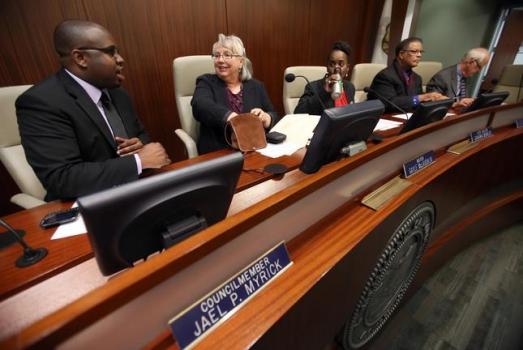|
| East Bay Times is welcome to its endorsement opinions, but I should point out errors its logic. The editorial states, “city officials propped up the latest one with revenues from a 2014 half-cent sales tax increase that they had suggested to voters would go toward fixing deteriorating roads. Forget about that; the tax is helping pay monthly bills.” This is simply untrue.
Measure U was a general tax. That it was somehow hijacked is an urban myth that anti-tax advocates continue to spread. The City’s website before the election stated: “What is Measure U? A ballot measure proposing a one-half cent sales tax to maintain and enhance essential city services, such as public safety, public health and wellness programs, city youth programs and street paving.”
The actual title for Measure U that appeared on the ballot contained 36 words, only two of which mentioned “street paving.”
Shall the City of Richmond adopt a one-half cent transactions and use (sales) tax, to fund and maintain essential city services, such as public safety, public health and wellness programs, city youth programs and street paving?
In fact, the first year’s proceeds from Measure U were used for all these things (“essential city services, such as public safety, public health and wellness programs, city youth programs and street paving”). The budget for street maintenance in this year (FY 2015-16) was substantially increased from FY 2014-15. The East Bay Times could have looked at the budget (http://www.ci.richmond.ca.us/DocumentCenter/View/34458) and found, for example, that the number of “city blocks resurfaced” rose from 80 to 96, and the number of potholes filled from 2,100 to 3,000. The Pavement Condition Index (PCI) was projected to rise from 62 to 63. The only thing the City did not do, with an abundance of caution, was to immediately float a bond for street repairs that would have tied up Measure U revenue for many years to come.
Editorial: In Richmond, elect Pimplé, Zepeda, Myrick 
(Jane Tyska/Bay Area News Group)
Control of the Richmond City Council will be determined by the Nov. 8 election.
By East Bay Times editorial
PUBLISHED: October 10, 2016 at 10:00 am | UPDATED: October 10, 2016 at 3:39 pm
Just as some city leaders finally begin to acknowledge Richmond’s precarious financial footing, a swing of just one seat in the Nov. 8 council election could leave the fiscally undisciplined Richmond Progressive Alliance in control.
The alliance holds three of the seven City Council seats and none of them are up for election this year. Thus, moderates must retain all three seats on the ballot this year to prevent an RPA majority and financial chaos.
Vinay Pimplé (Dan Honda/Bay Area News Group)
The city needs leaders who understand and will address Richmond’s severely weak finances. None surpasses Vinay Pimplé, who was appointed in early 2015 to fill a City Council vacancy and is now facing voters for the first time.
In less than two years on the council, Pimplé, a lawyer and former software engineer, has proven to be — by far — the smartest and most financially astute member. He reasonably balances needs for city services with fiscal reality.
Cesar Zepeda (Dan Honda/Bay Area News Group)
We also endorse Cesar Zepeda, an insurance agent who has studied the city’s finances. He’s president and founder of the Hilltop District Homeowners and Stakeholders Association; co-founder of Richmond Rainbow Pride; and a founding member of Somos Latin@s, created to empower and increase the Latino voice in Richmond and Bay Area.
Finally, we back re-election of Jael Myrick, who shows an independent voice while respecting the need to address city finances. Myrick understands the city’s tenuous financial position but is still rough on some financial details.
Jael Myrick (Dan Honda/Bay Area News Group)
Too many officials, including City Manager Bill Lindsay, falsely claim Richmond’s budgets are structurally balanced. In fact, city officials propped up the latest one with revenues from a 2014 half-cent sales tax increase that they had suggested to voters would go toward fixing deteriorating roads. Forget about that; the tax is helping pay monthly bills.
The city is also balancing the budget by failing to make minimum payments on the city’s huge debt for worker’s retiree health coverage. It’s like a household that fails to make minimum payments on credit cards; the debt continues to grow.
For that and other reasons, the shortfall for employees’ pension and retiree health benefits, which the city must pay, has soared 29 percent in two years to $577 million, or about $5,300 per resident.
Meanwhile, Standard & Poor’s last year cut the city’s credit rating to just above junk-bond level. Moody’s lowered it all the way to junk-bond status, the lowest level of 68 California cities it rates.
The biggest deniers of the city’s fiscal crisis are members of Richmond Progressive Alliance, especially Councilwoman Gayle McLaughlin, whose eight-year reign as mayor ended after the 2014 elections.
For the sake of the city, for the sake of their pocketbooks, residents should vote carefully. |
|

